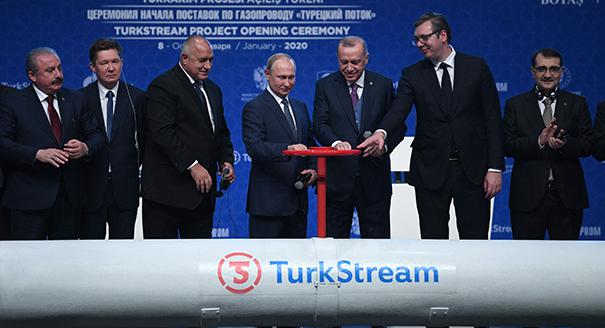Last September 1, BOTAS, Turkey’s state-owned natural gas utility, delivered bad news to customers. It hiked up prices by 20.4 percent for households, 47.6 percent for small- and medium-size enterprises, and 50.8 percent for industrial consumers.
That increase was not unprecedented. Last June, prices were raised by 30 percent for households, 16 percent for power stations, and 10 percent for industries. Since the beginning of 2022, the increase for large-scale industry has been close to fourfold, while charges for households have nearly doubled. If the end of 2020 is taken as a benchmark, the rise in natural gas prices has increased more than sixfold.
Expensive rates hurt a vast segment of the Turkish population, particularly as winter sets in and demand surges. Data from 2020 show that 16.8 million households out of a total of 22.4 million, according to the National Statistical Office, consume gas directly. Many more are reliant on electricity whose price is tied to gas. On September 1, EDPK, the electricity regulator, announced a 20 percent rise for households and an 80 percent rise for industry. At this moment, the average Turkish consumer pays around $250 for a megawatt-hour, compared to $198 in Germany and $172 in Spain.
Soaring energy bills have only exacerbated Turkey’s chronic problems with inflation. According to official data, year-on-year consumer prices have shot up by 80 percent on an annual basis, a surge not seen in some 24 years. However, unofficial estimates by ENAG, a group of economists, suggests that the actual rate is much higher. Last July, ENAG set the figure at a whopping 176.1 percent. By comparison, the eurozone, which is likewise confronting the threat of inflation, is grappling with a rate of about 9 percent.
It is hard to overestimate the political ramifications of inflation, generally, and the higher cost of energy, in particular. Turkish President Recep Tayyip Erdoğan is fighting for reelection next June. In parallel, the Justice and Development Party (AKP) that he leads is hoping to retain its position as the largest force in the Turkish Parliament. Yet what was once the AKP’s top selling point—competent management of the economy—is now a liability. The president’s meddling in monetary policy has made a difficult situation worse in that interest rates are being kept low, contrary to the trend in major economies worldwide. The resulting slump in the Turkish lira, runaway inflation, and the higher cost of living are eroding Erdoğan’s support. His popularity rating is at an all-time low. The six-way opposition bloc formed around the Republican People’s Party and the Good Party is hopeful it can win power, as it did in large Turkish cities, including Istanbul and Ankara, during the 2019 local elections. A freezing winter and high energy prices might convince enough voters not to back Erdoğan and the AKP.
As one might expect, the authorities are doing their utmost to alleviate the impact of skyrocketing energy bills. The differential gas charges to industry and household consumers hint at the fact that BOTAS subsidizes the latter. As a result, the company is running large deficits. In 2021, it received a bailout from the state budget to the tune of 100 billion Turkish liras (or $6.8 billion). BOTAS is also purchasing billions of dollars from the Central Bank needed to pay for imports. When natural gas prices in Europe are going through the roof, owing to the fallout from the war in Ukraine, this places an additional burden on the Turkish economy.
All this highlights the contending forces at play for the country. Erdoğan is trying to profit from the war geopolitically, playing an intermediary between Ukraine and Russia, and occasionally succeeding. But the conflict is adding to Turkey’s troubles at home. Roughly half of the 62 billion cubic meters (bcm) of natural gas consumed annually in the country arrives by pipeline from Russia. Last January, BOTAS signed a new four-year deal with Gazprom for 5.75 bcm annually, to be delivered through the TurkStream pipeline. On the face of it, this strengthens Turkey’s energy security as the flows from Russia have not been interrupted, in contrast with supplies going to the European Union. Since TurkStream bypasses Ukraine, Turkey is not at risk of being cut off because of the fighting.
At the same time, the weakening lira is driving up the cost of gas imports as supply contracts are denominated in U.S. dollars. Even though BOTAS pays less than other customers because its contract is linked to oil prices and not to spot prices at Europe’s gas hubs, as is the case with Gazprom’s deals with Hungary or Greece, it is still under strain. Turkey is running a huge trade deficit—$62.2 billion in the period between January and July this year, a 143.7 percent increase compared to a year earlier. Ankara is buying more Russian oil as well, doubling its purchases to 200,000 barrels per day. That choice has a marginally positive effect as Russian crude is currently being sold at a discount. But it hardly changes the overall picture.
Rather than twisting Moscow’s arm to demand better commercial conditions, Erdoğan seems willing to accommodate Putin. At the recent Shanghai Cooperation Council summit in Samarkand, the two declared that Turkey would be paying for 25 percent of its gas in rubles. Though we have yet to see all the modalities involved, it implied that Ankara would be purchasing Russian currency with its dollar reserves to settle payments. The boost for the ruble’s exchange rate along with the falling lira will mean Turkey will absorb the losses. While suspicions are rife that Erdoğan is trying to profit from Western sanctions and attract business to Turkey as a backdoor to Russia, his energy diplomacy could prove counterproductive.






